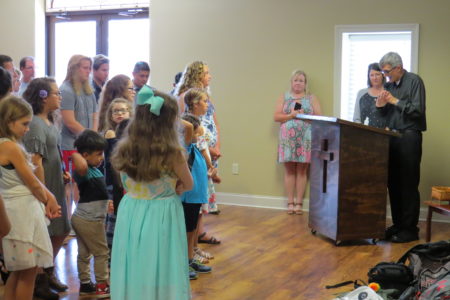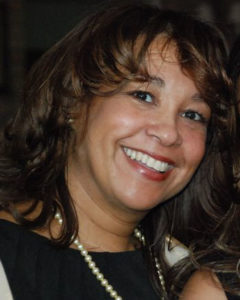By Julie Asher
WASHINGTON(CNS) – The president of the U.S. Conference of Catholic Bishops Aug. 16 announced three key goals and a comprehensive plan to address the “moral catastrophe” of the new abuse scandal hitting the U.S. church.
The plan “will involve the laity, lay experts, the clergy and the Vatican,” Cardinal Daniel N. DiNardo of Galveston-Houston said. This plan will be presented to the full body of bishops at their general assembly meeting in Baltimore in November.
He said the “substantial involvement of the laity” from law enforcement, psychology and other disciplines will be essential to this process.
He also said that right now, it is clear that “one root cause” of this catastrophe “is the failure of episcopal leadership.”
In a lengthy letter addressed to all Catholics, Cardinal DiNardo laid out three goals just established by the bishops’ Executive Committee in a series of meetings held early the week of Aug. 13.
The first is a “full investigation” into “the questions surrounding” Archbishop Theodore E. McCarrick, a former cardinal and retired archbishop of Washington. He said the Executive Committee will ask the Vatican to conduct an apostolic visitation into these questions “in concert with” a group of laypeople identified for their expertise by the USCCB’s lay-run National Review Board who will be “empowered to act.”
With a credible allegation that Archbishop McCarrick abused a minor nearly 47 years ago and accusations of his sexual misconduct with seminarians, many have been asking how the prelate could have risen up the ranks of the church as an auxiliary bishop, bishop, archbishop and finally cardinal.
Cardinal DiNardo described the second and third goals, respectively, as an opening of new and confidential channels for reporting complaints against bishops, and advocacy for more effective resolution of future complaints.
The three goals “will be pursued according to three criteria: proper independence, sufficient authority and substantial leadership by laity,” he said.
“Two weeks ago, I shared with you my sadness, anger and shame over the recent revelations concerning Archbishop Theodore McCarrick,” the cardinal said. “Those sentiments continue and are deepened in view of the Pennsylvania Grand Jury report.
We are faced with a spiritual crisis that requires not only spiritual conversion, but practical changes to avoid repeating the sins and failures of the past that are so evident in the recent report,” he added.
Cardinal DiNardo said the members of the Executive Committee “have already begun to develop a concrete plan for accomplishing these goals, relying upon consultation with experts, laity and clergy, as well as the Vatican.”
In addition to this being presented to the full body of bishops at their Baltimore assembly, the cardinal said he will go to Rome to present these goals and criteria to the Holy See, and to urge further concrete steps based on them.”
“The overarching goal in all of this is stronger protections against predators in the church and anyone who would conceal them, protections that will hold bishops to the highest standards of transparency and accountability,” Cardinal DiNardo explained.
He elaborated on each of the goals he described, starting with the “full investigation” of the Archbishop McCarrick case and questions surrounding it.
“These answers are necessary to prevent a recurrence,” he said, and “so help to protect minors, seminarians and others who are vulnerable in the future.”
He said the second goal “is to make reporting of abuse and misconduct by bishops easier.”
“Our 2002 ‘Statement of Episcopal Commitment’ does not make clear what avenue victims themselves should follow in reporting abuse or other sexual misconduct by bishops,” he explained. The statement is in the bishops’ “Charter for the Protection of Children and Young People,” approved in Dallas in 2002, and revised in 2005, 2011 and 2018.
“We need to update this (commitment) document,” Cardinal DiNardo said. “We also need to develop and widely promote reliable third-party reporting mechanisms. Such tools already exist in many dioceses and in the public sector and we are already examining specific options.”
The third goal has to do with advocating for “better procedures to resolve complaints against bishops,” he said.
“For example, the canonical procedures that follow a complaint will be studied with an eye toward concrete proposals to make them more prompt, fair, and transparent, and to specify what constraints may be imposed on bishops at each stage of that process,” he said.
He also laid out the three criteria for pursing these goals: “genuine independence,” authority and “substantial involvement by the laity.”
“Any mechanism for addressing any complaint against a bishop must be free from bias or undue influence by a bishop,” he said. “Our structures must preclude bishops from deterring complaints against them, from hampering their investigation or from skewing their resolution.”
Author Archives: Tereza Ma
Pope: Abuse victims’ outcry more powerful than efforts to silence them
By Cindy Wooden
VATICAN CITY (CNS) – “No effort must be spared” to prevent future cases of clerical sexual abuse and “to prevent the possibility of their being covered up,” Pope Francis said in a letter addressed “to the people of God.”
“I acknowledge once more the suffering endured by many minors due to sexual abuse, the abuse of power and the abuse of conscience perpetrated by a significant number of clerics and consecrated persons,” the pope wrote in the letter dated and released Aug. 20.
The letter was published less than a week after the release of a Pennsylvania grand jury report on decades of clerical sexual abuse and cover-ups in six dioceses. The report spoke of credible allegations against 301 priests in cases involving more than 1,000 children.
“The heart-wrenching pain of these victims, which cries out to heaven, was long ignored, kept quiet or silenced,” Pope Francis said. “But their outcry was more powerful than all the measures meant to silence them.”
“The pain of the victims and their families is also our pain,” he said, “and so it is urgent that we once more reaffirm our commitment to ensure the protection of minors and of vulnerable adults.”
In his letter, Pope Francis insisted all Catholics must be involved in the effort to accompany victims, to strengthen safeguarding measures and to end a culture where abuse is covered up.
While the letter called all Catholics to prayer and fasting, it does not change any current policies or offer specific new norms.
It did, however, insist that “clericalism” has been a key part of the problem and said the involvement of the laity will be crucial to addressing the crime and scandal.
Change, he said, will require “the active participation of all the members of God’s people.”
“Many communities where sexual abuse and the abuse of power and conscience have occurred,” he said, are groups where there has been an effort to “reduce the people of God to small elites.”
“Clericalism, whether fostered by priests themselves or by lay persons, leads to a split in the ecclesial body that supports and helps to perpetuate many of the evils that we are condemning today,” Pope Francis said. “To say ‘no’ to abuse is to say an emphatic ‘no’ to all forms of clericalism.”
In his letter, Pope Francis acknowledged the church’s failure.
“With shame and repentance, we acknowledge as an ecclesial community that we were not where we should have been, that we did not act in a timely manner, realizing the magnitude and the gravity of the damage done to so many lives,” he wrote.
“We showed no care for the little ones,” Pope Francis said. “We abandoned them.”
“Looking back to the past, no effort to beg pardon and to seek to repair the harm done will ever be sufficient,” he said. “Looking ahead to the future, no effort must be spared to create a culture able to prevent such situations from happening, but also to prevent the possibility of their being covered up and perpetuated.”
Recognizing the safeguarding policies that have been adopted in various parts of the world as well as pledges of “zero tolerance” for abusive clerics, Pope Francis also acknowledged that “we have delayed in applying these actions and sanctions that are so necessary, yet I am confident that they will help to guarantee a greater culture of care in the present and future.”
As members of the church, he said, all Catholics should “beg forgiveness for our own sins and the sins of others.”
Pope Francis also asked Catholics to pray and to fast so that they would be able to hear “the hushed pain” of abuse survivors.
He called for “a fasting that can make us hunger and thirst for justice and impel us to walk in the truth, supporting all the judicial measures that may be necessary. A fasting that shakes us up and leads us to be committed in truth and charity with all men and women of good will, and with society in general, to combating all forms of the abuse of power, sexual abuse and the abuse of conscience.”
In Washington, the president of the U.S. Conference of Catholic Bishops said by opening his letter with these words of St. Paul, “If one part suffers, all parts suffer with it’,” Pope Francis “shows that he is writing to all of us as a pastor, a pastor who knows how deeply sin destroys lives.”
In a statement issued late Aug. 20, Cardinal Daniel N. DiNardo of Galveston-Houston responded in particular to these words from the pope: “Penance and prayer will help us to open our eyes and our hearts to other people’s sufferings and to overcome the thirst for power and possessions that are so often the root of those evils.”
Trained for service
PEARL – St. Jude Parish has a whole new set of altar servers to join their “veteran” servers thanks to a day-long training and retreat Saturday, August 4. The day included fun as well as prayer and lessons. (Photos by Rhonda Bowden)
Summer service
MERIDIAN – Nine young people and two adults from the Catholic Community of Meridian traveled to Knoxville for the Alive In You Catholic Camp and Conference, June 19-24 for a week of service work. One of the projects was at the Knoxville Dream Center, a homeless outreach and food distribution Center. Students helped load a food truck and then helped give out the food to residents at a low income apartment complex that was in a so-called “food desert” area with no grocery store nearby. That afternoon the students helped the Center with various projects around their warehouse. At left, (l-r) Jean Karol Mayo, Kirstie Graves, Serena Sanders and Edwar Hernandez stand across the table from Cassy Klutz, Colby Evans and Mason Daniels. The youth were stuffing ziplock bags with condiments and utensils for the center’s upcoming Independence Day dinner for the homeless people under the bridge in Knoxville. (Photo by John Harwell)

Vardaman summer camp offers variety of experiences
VARDAMAN – The Catholic Charities Northeast Office ended its three-week summer program for 40 students from kindergarten through seventh grade with a big celebration Thursday, July 26. The center partnered with local businesses to offer classes in art, gardening, civic involvement and culture. Bancorp South and Topashaw Farms both donated to the program. In photo above, Father Tim Murphy learns about the flowers the children have planted. (Photos by John Lundardini)
Cool start to school year

SOUTHAVEN – A work crew lowers a new air conditioning unit into place after removing the one that died beyond any repair on July 23, just weeks before school started at Sacred Heart School. The crew had to use a crane to lift the unit over a fence onto the roof. (Photo by Sister Margaret Sue Broker)
Students, supplies, teachers blessed for new year

VICKSBURG –At left, Father Tom Lalor extends a blessing to the children of his parish, St. Paul, on Sunday, August 5, at the 10:30 a.m. Mass. Many of these children attend Vicksburg Catholic School, which started classes Tuesday, August 7. (Photo by Allyson Johnston)

PEARL – At right, Father Lincoln Dall snaps a photo of backpacks waiting to be blessed at St. Jude Parish while the director of religious education, Stacy Wolf, begins the blessing service. (Photo by Rhonda Bowden)
Communication office adds staff member

Berta Mexidor
By Maureen Smith
JACKSON – The Offices of Communications and Vocations welcomed Berta Mexidor to the staff on Monday, July 31. A native of Cuba, Mexidor has been in the U.S. for 13 years. She will be managing Spanish-language content for Mississippi Católico as well as doing administrative work for the Office of Vocations.
Mexidor has a variety of experience, including being a co-founder of the “Libertad” – Freedom Free Press Agency and the Independent Libraries movement in Cuba. She moved to Mississippi in 2005, one month before Hurricane Katrina devastated much of the state, to continue her work with libraries in her home country. She has also worked as a Spanish teacher, economics teacher and translator for several agencies in the state.
Her treasure is being mother of three and grandmother of two.
She is a member of Flowood St. Paul Parish, where she found a welcome even before she knew enough English to understand the whole Mass. Her experience growing up in Communist Cuba strengthened rather than weakened her faith.
“Jesus finds you even where you need to deny him, in a communist island, under an atheist regime” she said. She was baptized Catholic at birth, but as a child witnessed the image of Saint Francis intentionally drowned in the ocean of her small town as a demonstration of the community’s rejection of faith. Having children and encountering her own cross in life reconnected Berta with God and she found ways to quietly pursue her faith before she immigrated.
She has a special devotion to Our Lady of Charity also known as Our Lady of El Cobre or Nuestra Señora de la Caridad del Cobre, she is grateful for all her experiences in Cuba and Mississippi. “Jesus found me a long time ago,” she said. She now recognizes that he was sustaining her during the storms.
Catholic School educators explore gifts to share this year
By Maureen Smith
Teachers, administrators and staff at all the Catholic Schools in the Diocese of Jackson are ready to share their gifts with students again this year. Each year, the Office of Catholic Schools selects a theme to unify all the schools across the diocese. The 2018/2019 theme is GIFTS – Gratefully Inspiring Faith Teaching Service
Before school started each school hosted a Catholic identity session focusing on the Beatitudes.
Fran Lavelle, Director of Faith Formation; Stephanie Brown, coordinator of school improvement, and Karla Luke, assistant superintendent developed the sessions using Blessings for Leaders: Leadership Wisdom from the Beatitudes by Dan R. Ebener and the recent Apostolic Exhortation of Pope Francis, Gaudete Et Exsultate, as source documents.
According to superintendent Catherine Cook, the sessions were designed to assist faculty and staff in their faith journey of moving from disciples to apostles. Ebner says, “Disciples follow, learn, and then become Apostles. Apostles lead, teach, and make disciples.”
Lavelle and Brown led a Day of Reflection for metro Jackson area schools and Vicksburg Catholic. Lavelle travelled to Greenville St. Joseph while Brown and Luke led the day at Meridian St. Patrick School. Clarksdale has scheduled a day later in the month.
The remaining schools were provided the presentation materials to use on their own. In Columbus, pastor Father Jeffrey Waldrep headed up their day.
Each school agreed on five values they wanted to emphasize this year. Then, the staff divided into five teams to write a one-sentence prayer about their value. By the end of the day the sentences became a school prayer for the year.
Book reviews
By Mark Judge Catholic News Service
“Francis: The People’s Pope” (Seven Stories Press), a graphic biography by journalist and cartoonist Ted Rall, is, in its way, a celebration of the current successor of St. Peter.
Written from a far-left political perspective, the book calls Pope Francis a refreshing new leader but argues that he isn’t liberal enough.
While entertainingly drawn and sharply written, ultimately the book is too tendentious in its political bias.

This is an image from “Francis: The People’s Pope,” a graphic biography by journalist and cartoonist Ted Rall. Written from a far-left political perspective, the book calls Pope Francis a refreshing new leader, but argues he isn’t liberal enough. (CNS photo/Seven Stories Press)
Rall, an atheist and Pulitzer Prize finalist, advocates for same-sex marriage, contraception, married priests, female priests and abortion. Acknowledging the unlikelihood of the Catholic Church ever changing its stance on these core issues – the pontiff himself has no power to revise dogma, though the celibacy of the clergy is a matter of practice, not technically doctrine – Rall instead celebrates Francis as the harbinger of a “new tone” in the church.
Throughout “The People’s Pope,” Rall lays out some truths, but often in an incomplete or misleading manner. He zeros in, for instance, on Pope Francis’ famous 2013 comments about judgment and homosexuality. Speaking to reporters on the return flight from a trip to Brazil, the pope said, “If a person is gay and seeks out the Lord and has goodwill, who am I to judge?”
Rall omits the pope’s subsequent clarification: “I was paraphrasing by heart the Catechism of the Catholic Church where it says that these people should be treated with delicacy and not be marginalized.
“I am glad that we are talking about ‘homosexual people’ because before all else comes the individual person, in his wholeness and dignity. And people should not be defined only by their sexual tendencies: Let us not forget that God loves all his creatures and we are destined to receive his infinite love.”
The pontiff added: “I prefer that homosexuals come to confession, that they stay close to the Lord and that we pray all together. You can advise them to pray, show goodwill, show them the way and accompany them along it.”
A colorfully illustrated volume, “The People’s Pope” is separated into brief sections covering a wide variety of topics. In the passage on church history, Rall lashes the church for jailing Galileo and unfairly tars it with not doing enough to resist the Nazis.
Rall also deals with the Second Vatican Council, the life of Jorge Mario Bergoglio in Argentina before he became pope, the sexual abuse scandal that hit the church beginning in 2002, South American liberation theology, the Catholic response to the war on terror and the pontificates of St. John Paul II and Pope Benedict XVI.
The frank treatment of war and sexuality, including pedophilia – as well as the off-kilter way in which the church is repeatedly portrayed – make this unsuitable for younger readers. Nor can it be endorsed for grownups lacking in knowledge of the faith.
Rall offers a straightforward account of Francis’ youthful life, then turns to the “dirty war” that tore Argentina apart in the 1970s and 1980s. A middle-age Jesuit at the time, then-Father Bergoglio has been accused of both aiding the right-wing “Iron Guard” in power and the leftist guerrillas in opposition. “His legacy is murky” here, concludes Rall.
In another section Rall criticizes St. John Paul as “the anti-Francis.” John Paul, he argues, was an “establishmentarian” standing in opposition to Francis, the champion of the poor.
Yet it’s difficult to argue that the Polish pope, who grew up in a war-torn country destroyed by both fascists and communists, didn’t have sympathy for – or contact with – the poor. Faced with this, even Rall admits that John Paul “was deeply concerned about the oppressed.”
Furthermore, while Rall touts Pope Francis’ “refreshingly modern views on sex,” he doesn’t note that, far from being ashamed of human sexuality, Karol Wojtyla initiated the theology of the body – and the dynamic of human love was central to his whole theological vision.
Like Rall, both Popes Francis and John Paul opposed the Iraq War.
Rall has a primitive drawing style, but he gives his characters personality and humor. He writes in a simple, declarative style that presents arguments with selective research but does avoid hectoring.
To marshal his case, Rall quotes church historians and theologians who agree with him. In the softball section on liberation theology, the Marxist-tinged strain of Catholicism that excited the Christian left in the 1970s and1980s, Rall quotes Fidel Castro to the effect that “he who betrays the poor betrays Christ.”
After more than 200 pages of graphics, cartoons and reproduced newspaper headlines, Rall comes to his conclusion: “No doubt about it: Francis is a breath of fresh air to an institution that badly needs it. But he isn’t a wild-eyed liberator.”
Of course, form the subjective view of a political activist, the same could be said about any number of church leaders from St. John XXIII, who convened Vatican II, to St. John Paul, who helped destroy the prison of European Communism.
The graphic biography contains a distorted view of Catholicism as well as mature themes and images. The Catholic News Service classification is L – limited adult audience, material whose problematic content many adults would find troubling. Not otherwise rated.
(Judge reviews video games and comic books for Catholic News Service.)
By Kathleen Finley Catholic News Service
“Joined by Grace: A Catholic Prayer Book for Engaged and Newly Married Couples” by John and Teri Bosio. Ave Maria Press (Notre Dame, Indiana, 2017). 136 pp., $9.95.
“Forever: A Catholic Devotional for Your Marriage” by Jackie Francois Angel and Bobby Angel. Pauline Books and Media (Boston, 2017). 163 pp., $15.95.
“Prayers for Catholic Couples: With Reflections from Pope Francis’ ‘The Joy of Love,'” compiled and edited by Susan Heuver. Word Among Us Press (Frederick, Maryland, 2017). 167 pp., $11.95.
Whether they know it or not, married couples today need lots of prayer to live their vocation well. They always have, but perhaps today they may need it more than ever. Three recently published books approach this need in rather different ways.
Of the three, the most like a traditional Catholic prayer book is “Joined by Grace,” in which John and Teri Bosio have compiled a great many traditional Catholic prayers, from prayers from the Mass to litanies to praying with some of the saints to other devotions, such as the rosary and the stations of the cross, each with a brief explanation.

For couples already connected well to a parish and mainly comfortable with formal prayers, this may be quite helpful; however, it’s unfortunate that these prayers and devotions aren’t linked more specifically with the joys and challenges that marriage presents.
The second book, “Forever” by Jackie Francois Angel and Bobby Angel, is designed as a four-week exploration of the theology of the body from St. John Paul II, a theology that some couples have found more helpful than others. It tends to be rather didactic and not as devotional as a prayer book often would be, perhaps suitable for a couple to read aloud to one another daily, but what the Angels have done here requires a considerable time commitment on the part of a couple.
Last, but not least, is “Prayers for Catholic Couples,” which includes brief excerpts from Pope Francis’ 2016 apostolic exhortation “The Joy of Love” (“Amoris Laetitia”). Susan Heuver has done a fine service for couples in making insights from this compassionate document easily available to couples for their reflection.
In his introduction to his pastoral letter, Pope Francis explained, “It is my hope that, in reading this text, all will feel called to love and cherish family life, for ‘families are not a problem; they are first and foremost an opportunity.'” That tone indeed comes through in this little book.
Pope Francis talks about the lack of perfection in families: “No family drops down from heaven perfectly formed; families need constantly to grow and mature in their ability to love.”
He observes about marital fidelity that “just as a good wine begins to breathe with time, so too the daily experience of fidelity gives married life richness and ‘body.’ Fidelity has to do with patience and expectation. Its joys and sacrifices bear fruit as the years go by and the couple rejoices to see their children’s children. The love present from the beginning becomes more conscious, settled and mature as the couple discovers each other anew day after day, year after year.”
He even discusses parenting: “It is also essential to help children and adolescents to realize that misbehavior has consequences. They need to be encouraged to put themselves in other people’s shoes and to acknowledge the hurt they have caused. … It is important to train children firmly to ask forgiveness and to repair the harm done to others.”
After each brief excerpt from “The Joy of Love” Heuver includes a reflection question or two and a short prayer for the couple to share. These offer an opportunity for a couple to reflect on their lives on the run, which is often the only opportunity they may have.
All three of these books of prayers could be helpful for couples trying to live a faith-filled, sacramental marriage in a world that seems to value change and superficiality instead.
(Finley is the author of several books on practical spirituality, including “Prayers for the Newly Married” and “The Liturgy of Motherhood: Moments of Grace,” and previously taught in the religious studies department at Gonzaga University.)
